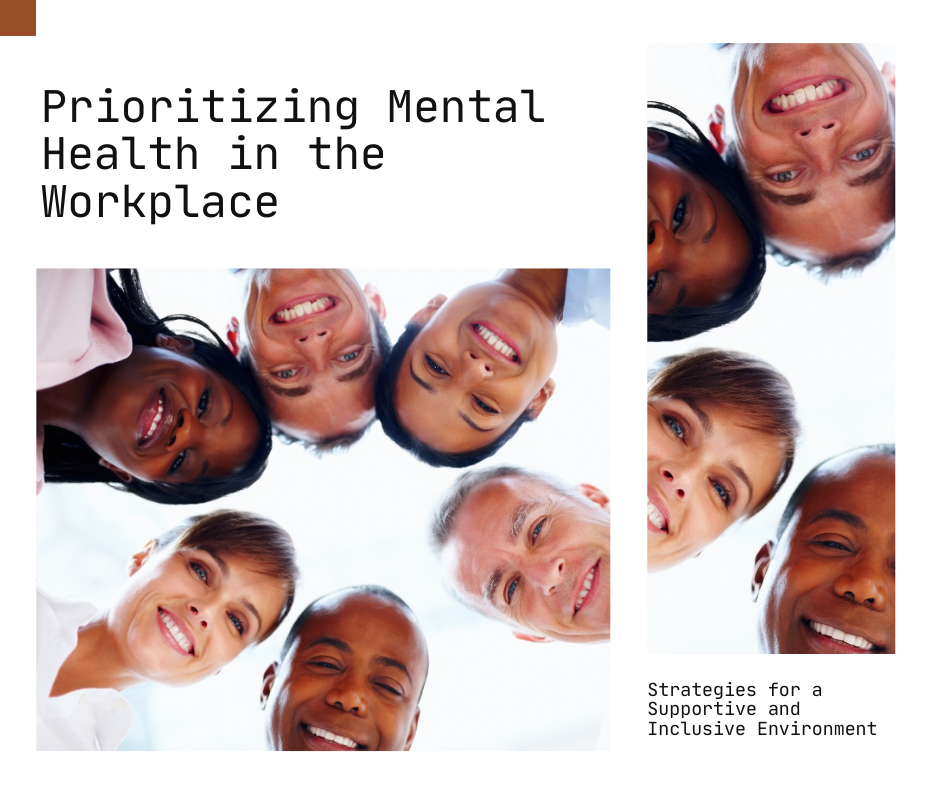Strategies for Cultivating a Supportive and Inclusive Mental Health Environment in the Workplace
Creating a mental health-friendly workplace is not just a moral obligation; it’s a strategic imperative. As awareness of mental health issues becomes increasingly widespread, organizations are recognizing the critical role they play in supporting their employees’ mental well-being. This blog explores the importance of mental health in the workplace, backed by compelling evidence and offering actionable strategies for organizations aiming to cultivate a supportive environment.
The Critical Importance of Mental Health in the Workplace
The Current Landscape: Recent studies have illuminated the profound impact of mental health on overall workplace productivity and employee satisfaction. The World Health Organization (WHO) estimates that depression and anxiety have a significant economic impact, costing the global economy approximately $1 trillion per year in lost productivity. This stark statistic underscores the urgency of addressing mental health in the workplace.
Employee Well-being and Productivity: A robust correlation exists between mental health and productivity. Employees in good mental health are more likely to maintain high levels of productivity, exhibit lower absenteeism rates, and demonstrate higher engagement levels. Conversely, untreated mental health conditions can lead to decreased performance, increased turnover rates, and higher healthcare costs.
Strategies for Fostering a Mental Health-Friendly Workplace
1. Promote Open Communication: Cultivate an environment where mental health is openly discussed. This involves destigmatizing mental health issues and encouraging employees to talk about their experiences without fear of judgment or repercussions. Leaders should lead by example, sharing their own experiences and demonstrating vulnerability.
2. Provide Mental Health Resources and Support: Make mental health resources readily available and ensure employees are aware of them. This can include access to counseling services, mental health days, and wellness programs. Employee Assistance Programs (EAPs) are invaluable, offering confidential counseling and support services.
3. Implement Flexible Work Arrangements: Flexibility can significantly reduce stress for employees who may be struggling with mental health issues. Options such as remote work, flexible hours, and the ability to take time off for mental health reasons can provide much-needed relief.
4. Train Managers in Mental Health Awareness: Managers play a crucial role in recognizing signs of mental distress in their team members. Providing training on mental health awareness and empathy can equip them to offer appropriate support and direct employees to available resources.
5. Foster a Supportive Company Culture: A culture that values diversity, inclusion, and support goes a long way in promoting mental health. Celebrate successes, recognize the efforts of your team, and ensure that everyone feels valued and included.
6. Conduct Regular Employee Wellness Surveys: Regularly check in with employees about their mental health and workplace environment. Use anonymous surveys to gather feedback on how the organization can better support mental health and well-being.
The Impact of a Mental Health-Friendly Workplace
Organizations that prioritize mental health not only enhance the well-being of their employees but also reap significant benefits. Improved employee retention, higher job satisfaction, and enhanced brand reputation are just a few of the positive outcomes. A study by Deloitte found that the return on investment (ROI) in mental health programs averaged 4.2 times the cost over three years, highlighting the tangible benefits of investing in mental health initiatives.
Conclusion
The importance of mental health in the workplace cannot be overstated. As the lines between work and personal life increasingly blur in today’s always-connected world, organizations have a responsibility to support their employees’ mental well-being. By implementing the strategies outlined above, companies can create a more inclusive, supportive, and productive workplace where everyone has the opportunity to thrive.
Supporting mental health in the workplace is an ongoing journey that requires commitment and continuous effort. By fostering open communication, providing adequate support, and cultivating a culture of inclusivity and care, organizations can make a profound difference in the lives of their employees and, ultimately, their bottom line. For more strategies on fostering a mental health-friendly workplace, visit hr2people.org. Together, we can create work environments where everyone feels supported, valued, and empowered to achieve their best.
